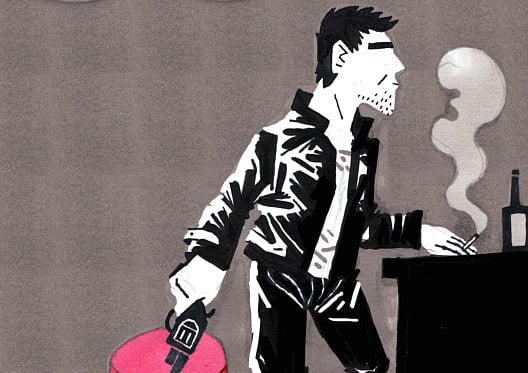Book review: ‘Screwed’
What is going on in Daniel McEvoy’s mind as he uses his skills to survive the underworld?

Irishman Eion Colfer seems to be able to write about everything from his native land, from Leprechauns to charming rogues, and many of his characters have the gift of the gab.
He is perhaps best known for the “Artemis Fowl” series of books, about a 12 year-old boy genius and his efforts to exploit a high-tech fairly world for his own advantage. The series, aimed at young adults, is a very different, imaginative update on childhood fairytales.
With Screwed, Colfer continues the story of another of his Irish characters. This time it is Daniel McEvoy, an Irish ex-soldier, scarred by his experiences as a United Nations peacekeeper in Lebanon — cue flashbacks — and an abusive childhood. Now he is using his combat skills to survive in the underworld of New Jersey. The character was first introduced in an earlier novel, “Plugged”, which was good enough to make this sequel something to look forward to.
“Screwed” is a novel very much meant for adults. It is a witty, “stream of consciousness”, first-person narrative through an eventful couple of weeks as McEvoy tries to keep himself, and a motley group of psychotic friends and family, alive while trying to get them out from under the thumb of a local Irish gangster, Mike Madden.
In a complicated double-cross, Madden sends McEvoy off on a suicide mission, aimed at helping him expand his small-time criminal empire. This becomes intertwined with McEvoy’s efforts to rescue an alcoholic aunt from herself — and a relative trying to get at her inheritance.
Even though McEvoy is desperately trying to avoid killing people, as he struggles to come to terms with his past, blood and amusing mayhem ensue. The entertainment value of the book is not so much in the plot or the increasingly slapstick comedy situations McEvoy finds himself in, but rather in his wry observations of the world Colfer has sketched for him, and his dry one-liners as he tries to talk his way out of trouble and make sense of his life.
He has a delusional girlfriend, who thinks McEvoy is her ex-husband with whom she is still in love — and he constantly has to battle temptation as he refuses to take advantage of her.
There is a friend, Zebulon Kronski, a fast-talking, self-medicating cosmetic surgeon, who knows exactly how to take advantage of McEvoy. His character has amusement value, but the dialogue on which it depends is a bit over-rated.
And there is his business partner, Jason Dyal, a big bouncer with a softer side and who is renovating the club they run in a way in which McEvoy will not necessarily comfortable.
McEvoy’s dry, running dialogue with himself as he tries to deal with them, and others, is the source of much of the humour in the book.
Helping McEvoy cope with all of this is his tweeting shrink, Simon Moriarty, who has his own set of problems. In a worrying insight into McEvoy’s state of mind, after sending a bit of possibly ambiguous advice about removing problem characters, Moriarty is moved to warn him to check any plans with him first. “The last thing I need is patients doing stuff in my name,“ Moriarty tweets.
There is also an assortment of villains who are bad caricatures of corrupt cops, hit-men and gangsters. From the beginning of the book Colfer makes it clear that the novel is his own tongue-in-cheek take on the gangster crime genre and its characters — so many of them are quite unashamedly far over-the-top.
McEvoy is the anti-hero of the story, so gets the unexpected breaks he needs to survive and end up pretty much where it starts — leaving room for another, well-earned, follow-up.
Sign up for the Daily Briefing
Get the latest news and updates straight to your inbox
Network Links
GN StoreDownload our app
© Al Nisr Publishing LLC 2026. All rights reserved.